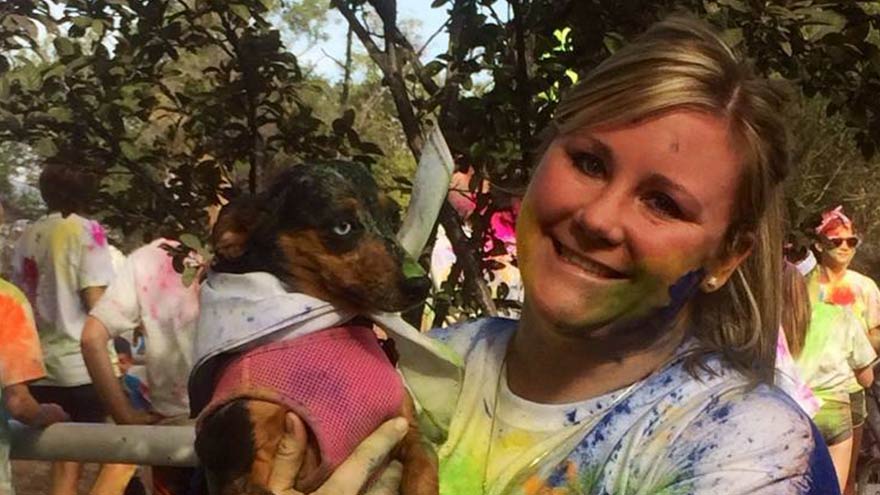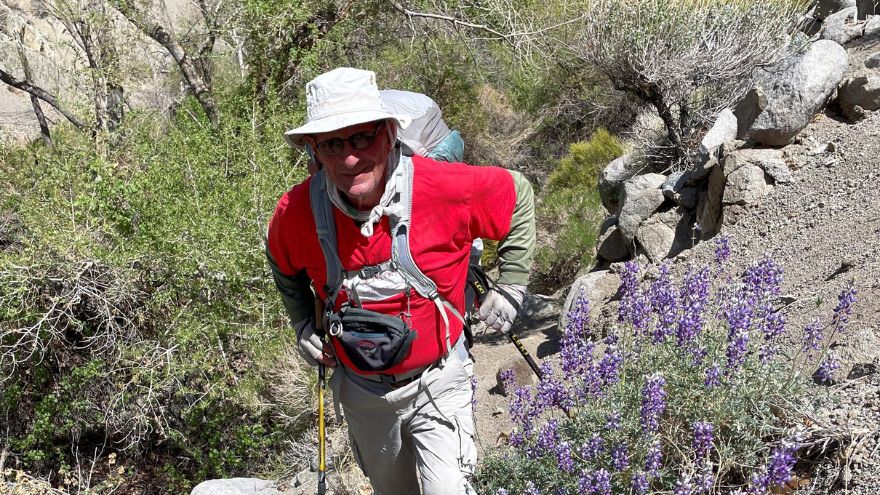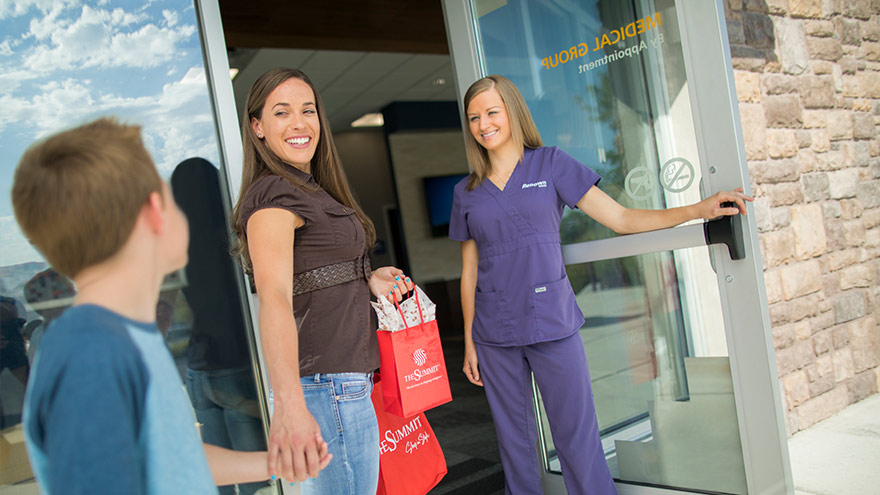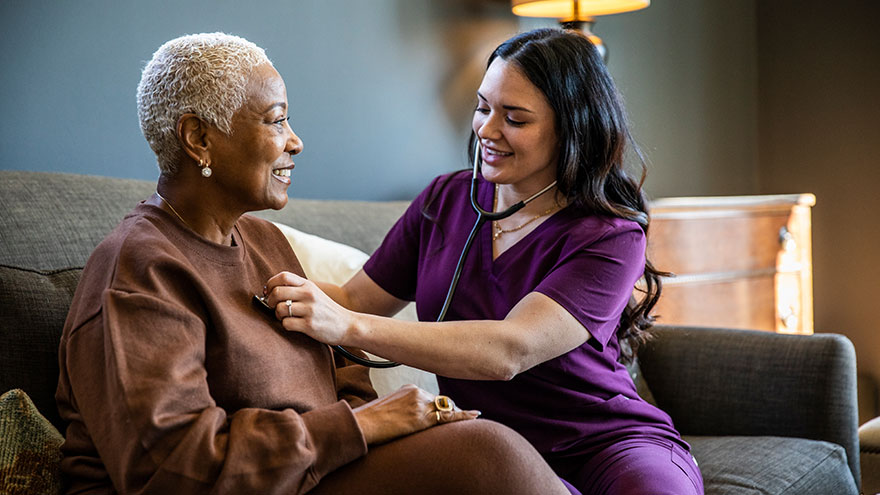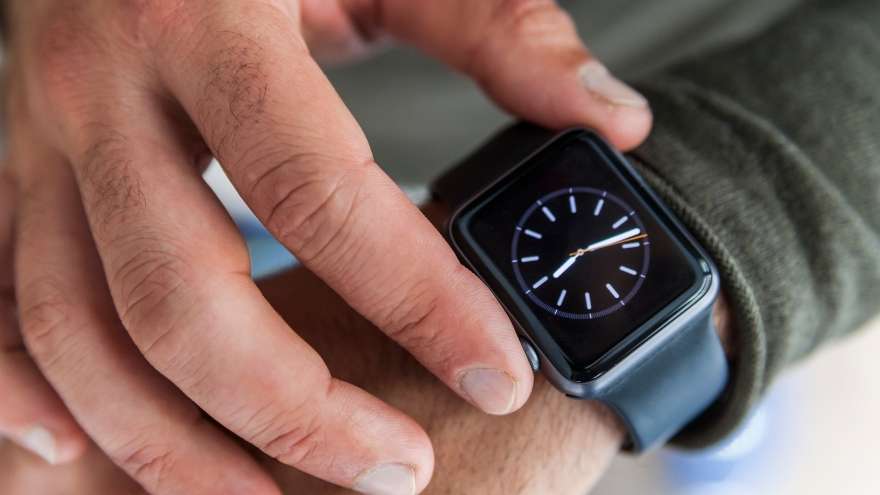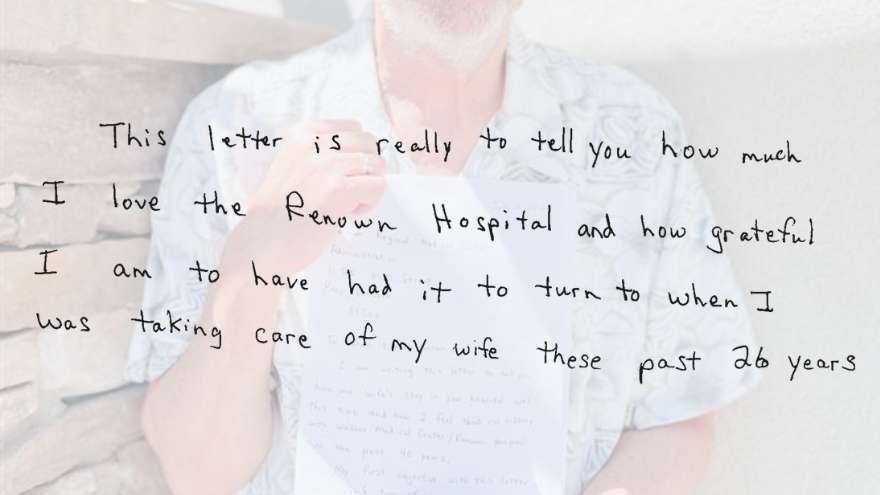Buscar
-
What You Need to Know About RSV
Respiratory syncytial virus, also known as RSV, is a common respiratory virus that impacts the lungs and breathing pathways. The virus can be dangerous for infants and young children and is also concerning for older adults. While most older kids and adults only experience cold-like systems and recover in a week or two, an estimated 58,000-80,000 children younger than 5 years old are hospitalized due to RSV each year, and in 2022 healthcare organizations across the country are experiencing higher infection rates than in years past. "We are experiencing a strong RSV season and do not expect it to go away anytime soon," said Dr. Kris Wilson, Division Chief of Renown Children's Primary Care. "Infants who are infected with RSV almost always show symptoms of runny noses and cough. Call your healthcare provider immediately if your child is having difficulty breathing, is not drinking enough fluids, or is experiencing any worsening of these symptoms.” Symptoms of RSV: Runny nose Decrease in appetite/inability to drink Dry diapers, an indication of dehydration Cough, which may progress to wheezing or difficulty breathing Irritability (most common in very young infants) Decreased activity (most common in very young infants) Decreased appetite (most common in very young infants) Apnea, pauses in breathing for more than 10 seconds (most common in very young infants) What to do if you think your child has RSV: Call your pediatrician! If you suspect your child might have RSV, consulting their healthcare provider is the best first line of defense. From here they will help you build an appropriate treatment plan for child. Keep in mind that many pediatrician offices offer 24/7 call lines. If your child is experiencing retracted breathing (when the area between the ribs and in the neck sinks in when a person attempts to inhale), dehydration (not drinking and decrease in wet diapers) or apnea (pauses in breathing for more than 10 seconds) please call 911 or go to the closest emergency room.
-
A Journey of Transformation Through Robotic Surgery at Renown Health
Carrie Hintz is constantly on the move. “I don’t sit well,” she said when discussing her career as an Emergency Room nurse at Renown South Meadows Medical Center. She has also earned a PhD in nursing research, a Nurse Executive DNP and an MSN in nursing and healthcare leadership, all while managing the joyful chaos of raising two toddlers under the age of four. She's always been on the move, but her journey to transformation through bariatric surgery with the da Vinci Surgical System is a testament to her determination and the vital need for cutting-edge robotic surgical tools at Renown Health. Carrie's life is non-stop, but her struggle with weight loss was a persistent challenge, compounded by the complexities of medical conditions like PCOS and a pituitary tumor, both of which made losing weight an uphill battle. It was while reading the news one night, witnessing a mother's disappointment at Disney Land due to weight restrictions, that Carrie decided to take charge of her life. She knew she had to make a change. In 2016, Carrie embarked on her bariatric surgery journey, seeking consultation with a Renown surgeon. However, her dreams of starting a family prompted her and her supportive husband to postpone surgery since one cannot have a baby within 18 months of the procedure. After welcoming two beautiful children into their lives, Carrie returned to Renown in 2022 to discuss her surgical options. Finally, in February 2023, and after six months of mandatory weight loss preparation, Carrie was ready to undergo the life-changing surgery. Dr. Alexander Ayzengart, her dedicated surgeon, had a plan that involved utilizing the da Vinci Surgical System for her bariatric procedure, coupled with repairing a hernia that had developed during her weight loss journey. The stage was finally set for Carrie's transformation. To everyone's surprise, the hernia turned out to be larger than anticipated, but miraculously, Carrie experienced no post-operative pain and minimal scarring. She reminisces about her early post-surgery days, confidently attributing her excellent outcomes to the remarkable da Vinci Surgical System. “I was up and walking around the night after the surgery,” she said. The da Vinci is no ordinary surgical tool; it's a state-of-the-art, minimally invasive robotic system skillfully operated by trained surgeons. Renown's commitment to innovation in healthcare paved the way for Carrie's remarkable journey.
Read More About A Journey of Transformation Through Robotic Surgery at Renown Health
-
Hiking Through Life After TAVR
Renown Health patient, Alden Nash, hiking Death Valley National Park just three months after a Transcatheter Aortic Valve Replacement. Alden Nash isn’t your average 80-year-old. For much of his life, he could be found outdoors enjoying nature and hiking some of the west coast’s highest elevations. A husband and father of two, Alden turned his passion into a career as a Yellowstone park ranger in 1965. Alden believes his passion for the outdoors is responsible for his many years of health – until the unavoidable happened. The Hardest Climb The number one doctor recommendation for a healthy heart – lead a healthy, active lifestyle. Any cardiologist would be thrilled to have Alden as a patient due to his robust physical activity regimen. “Don’t have a TV set or a lounge chair in your house and you’re all set,” said Alden when asked how he has remained so fit throughout his senior years. Unfortunately, many other factors come into play when it comes to heart health, one of which is the reason we are telling Alden’s story today. Familial history - it’s a hot topic in the world of medicine. Understanding your genetic risk factors can help care providers develop updated care plans based on your results. Alden’s family has a long history of high cholesterol, which he avoided for much of his life by staying active. This combined with his age resulted in his first heart attack in December 2021. Doctors later determined that Alden was suffering from a type of heart valve disease known as aortic valve stenosis. Aortic stenosis is the narrowing of your aortic valve opening that impedes normal blood flow. Over time, the leaflets of your aortic valve become stiff, reducing their ability to fully open and close. When the leaflets don’t fully open, your heart must work harder to push blood through the aortic valve of your body. Eventually, your heart gets weaker, increasing the risk of heart failure. People who are most at risk for aortic stenosis include those who have had certain heart conditions present at birth, have chronic kidney disease or have heart disease risk factors such as high cholesterol and high blood pressure. However, generally, aortic stenosis is a degenerative process of aging with no modifiable risk factors. The incidence of aortic stenosis increases rapidly with age and is very common above the age of 80 – with 1/10 having the condition and 1/50 with a problem severe enough to warrant surgery. When symptoms are present, the disease can be rapidly disabling or even deadly, often progressing over several months unless treated.
-
Getting Care During The Holidays
Although coined the most wonderful time of the year, the holiday season can unfortunately bring with it injuries and illness. Woke up on Christmas morning with the gift of a sore throat and fever? Sliced your finger carving the delicious turkey you spent all day preparing? While no one ever wants to cut their festivities short, the reality is we should all be prepared with how and where we will receive care should we need it. Are Renown Urgent Care Facilities Open During the Holidays? Renown Urgent Care sees patients 365 days a year, with limited hours on holidays, for medical concerns that are urgent but not life-threatening. Urgent care providers can treat everything from cuts and burns to fevers and allergic reactions and appointments can be booked ahead of time online. If no appointments are available, you may also walk into any of our various urgent care facilities. Conditions and injuries treated at urgent care include: Cuts Fractures Burns Sprains Fevers Allergic reactions Animal bites Rashes Sore throats Does Renown Offer In-Home Care Options on Holidays? If you’d like to see a healthcare provider without leaving the house and exposing others to illness, consider a Virtual Urgent Care Visit. This convenient video conference service allows you to see an urgent care provider from the comfort of your home using a cellphone, computer or tablet with video capabilities. Providers are available for video chat from 9 a.m. to 6 p.m. Monday through Friday, and 10 a.m. to 4 p.m. Saturday and Sunday. Scheduling a Virtual Visit is easy directly through MyChart. Login to MyChart and click on the "Talk to a doctor" video icon within the portal to get started. Before scheduling, be sure your illness or injury is included on the following list to ensure a healthcare provider can assist you virtually: Common cold and cough symptoms Muscular, tendon or joint pains not caused by injury Allergy or sinus symptoms Pink eye (no trauma or something in the eye) Urinary discomfort Diarrhea without vomiting Rashes or skin sores Backache Nail problems Screening examination for sexually transmitted illness (without symptoms) Medication refills (not controlled substances) When Should I Go to the Emergency Room? Urgent care and Virtual Visits are great options when experiencing minor illness or injury and it’s too urgent to see your primary care provider. Renown Emergency Rooms are designed to treat patients who need immediate attention for emergencies, such as: Burns Allergic reactions Broken bones Stitches Skin infections Heart attack Stroke Rashes Venomous stings and bites Asthma attacks Choking or poisoning Fainting, dizziness or confusion Head injuries Seizures Severe bleeding Difficulty breathing Severe headache Eye injuries Severe pain Renown Emergency Rooms are open 24 hours a day, 7 days a week, 365 days a year. For life-threatening emergencies, always call 9-1-1 immediately. We know there is nothing jolly about getting sick or injured during the holidays, but we hope you can find some comfort knowing that Renown Health is here with the care you need, when you need it most.
-
5 Things to Know About Women’s Heart Disease
Heart disease is more common in women than many people think. In fact, it is the leading cause of death in the United States, ahead of cancer and stroke. However, the common signs and symptoms we often associate with men and heart disease don’t always align with women. Thankfully, Renown Health is home to the first women’s heart center in Nevada. The Helaine Greenberg Women’s Heart Center gives women in our community the opportunity to receive exemplary care and education. “At the Women’s Heart Center, we are proud to offer the women of our community the treatments, therapies and education they need to fight this silent killer,” Dr. Danish Atwal. 1. The warning signs for heart disease present differently in women than they do in men. Both men and women may experience chest pain during a heart attack, but the similarity of symptoms ends there. Heart disease is especially problematic for women because more than half of women who die of heart disease have no symptoms at all. Women tend to have subtler symptoms that mimic symptoms associated with common, mild illnesses: Fatigue or weakness Pain, pressure or tightness in the center of the chest Pain that spreads to the upper body, neck or jaw Sweating, nausea or vomiting Sudden dizziness Shortness of breath Trouble sleeping 2. Women are often not treated with the same medications as men, even when they should be. Women are less likely to receive heart medication because their disease is often misdiagnosed or because they do not seek proper care. According to a study done by Harvard Health Publishing in 2020, “A general lack of awareness of women’s heart disease may lead to doctors or patients missing heart attacks in women or delaying their diagnosis. For example, while the frequency of cardiovascular disease tends to be lower in women before menopause than in men, the frequency dramatically increases after menopause, when it accounts for approximately one out of every three deaths in women. 3. Women who have hypertension, high cholesterol, type 2 diabetes or gestational diabetes during pregnancy are at a higher risk of a heart attack in the future. Women who experienced complications related to developing high blood pressure or hypertension during pregnancy had a 63% increased risk for developing cardiovascular disease later in life, as stated by research funded by the National Heart, Lung, and Blood Institute. According to that same study, researchers found that early screenings and monitoring in four target areas – blood pressure, cholesterol levels, glucose levels and body mass index – could provide even more personalized targets to help delay or possibly prevent future cardiovascular events among women.
Read More About 5 Things to Know About Women’s Heart Disease
-
Smart Watch Notification Saves a Life
In sailing, when you encounter rough seas, you can’t change the wind pattern, but you can adjust your sails. The same rings true for life. We confront unpredictable circumstances daily, but how we react to them can make all the difference. For Renown patient and avid sailor Robert (Dan) Seifers, recent events make this mantra reign true. A Concerning Alert Monday, Aug. 22, started out just like any other day for Dan. He was on a walk with his dog, enjoying the sunshine, when suddenly he felt a wave of dizziness and a buzz on his wrist. His Apple Watch alerted him that his heart rate had dropped to dangerous levels. Returning home immediately, he notified his wife, Carol. Doing their best not to panic, the couple confirmed the reading with their at-home blood pressure machine. The watch was right – Dan’s heart rate was in the low 30s. After taking some time to see if Dan’s heart rate would return to normal, the couple decided it was time he sought medical help. Conveniently, Carol had a lab appointment scheduled next door to Dan’s primary care physician, Dr. Bonnie Ferrara. The couple headed out the door, not realizing what the rest of the day would bring. The Next 48 Hours Upon arrival at the office, Dan calmly approached the front desk to explain his situation. With no delay, staff members sprang into action, quickly showing Dan to a patient room and notifying Dr. Ferrara. Before he knew it, Dan was receiving an electrocardiogram (EKG). Following a review of the results, Dr. Ferrara returned to let Dan know he needed to get to the hospital immediately. The rest of the afternoon moved quickly for the couple. Dr. Ferrara had already notified the Renown Regional Medical Center Emergency Room staff, who were on standby for the couple’s arrival. “Gee, this must be serious,” thought Dan, who at the time was experiencing no other alarming symptoms other than the low heart rate indicated on his watch. Several doctors and nurses began their analysis, including a chest x-ray, blood test and additional EKG. Confirming Dr. Ferrara’s results, a Renown cardiologists, Dr. Christopher Rowan and Dr. Shining Sun, joined Dan’s care team. Within two hours of checking into the hospital, Dan was admitted, monitored overnight and prepped for surgery to receive a pacemaker the next day. Tracking Your Heart Health Following the purchase of their Apple Watch devices, Dan and Carol were unaware of these heart health features. Like many others, they were looking forward to the next best tech gadget that would help them stay connected with their friends and family. Now, the couple says they will use their experience to spread the word about the importance of ensuring these settings are enabled. According to Apple, you can turn on these notifications from the Heart Rate app on your Apple Watch (Series 1 or later) to alert you to high or low heart rates and irregular heart rhythms. If you receive a notification, an irregular rhythm suggestive of atrial fibrillation (A-Fib) or a low or high heart rate has been identified and confirmed with multiple readings. In Dan’s case, the signal from his watch was the result of a heart block, a condition where the electrical signal that controls your heartbeat is partially or completely blocked. Dizziness and low heart rate are common symptoms of a heart block. But this was not the first time the couple had experienced this type of alert from their watch. More than a year and half ago, Carol’s watch notified her of an irregular heart rhythm that was suggestive of A-Fib. She immediately made an appointment with Dr. Danish Atwal, the lead cardiologist at Renown’s Helaine Greenberg Women's Heart Center. Thanks to medication prescribed by Dr. Atwal, Carol now lives a healthy, active life while managing her A-Fib, continuing to wear her Apple Watch, which can also help track her A-Fib History. “I’ll share our story with anyone who will listen and encourage them to get a smart watch. I consider myself an unofficial spokesperson,” said Carol with a chuckle. A Thankful Heart The Senior Care Plus members could not be more amazed at the way Dan was treated by the staff at Renown. “I wish I could personally thank them all. I will highly recommend Renown to all I come in contact with,” said Dan with his Apple Watch still proudly strapped to his wrist. “I was closely monitored and treated like royalty.” Quick action to medical emergencies like Dan’s is just one of the many reasons why collaboration is part of our four key values at Renown. The open line of communication between our primary care facilities and hospitals helped Dan get the prompt care he needed, right when he needed it. A month post-op, Dan is doing well and back to enjoying the things he loves during his retirement, including playing the harmonica in the Grumpy Old Man Band, exploring the northern Nevada backroads in his jeep and working on his swing at the golf course. Dan can rest assured that while enjoying the winds of life, if his heart begins to beat too slowly again, the pacemaker will send a signal to correct the beat. “The prompt attention to my heart block undoubtedly saved my life,” said Dan in what he calls his 6-star review of Renown Health. “Thank you from the bottom of my heart, which is happily beating at 60 beats per minute.” This article is not sponsored by or affiliated with Apple, Inc. For more information on the Apple Watch and it's features, visit apple.com.
-
40 Years of Exceptional Care
“In sickness and in health” are words we often hear when celebrating the momentous occasion of marriage with our friends, families and loved ones. For James Breckenridge, these words were the foundation of the love and commitment he and his wife Carolyn showed to each other during their 30 years of marriage. In health, James and Carolyn shared a love of traveling. Hopping in their van, driving across the continental United States and enjoying the views along the way will be a memory James cherishes forever. Unfortunately, their excursions would be cut short when Carolyn fell ill, rerouting to their local hospital, Renown Health. Carolyn has spent more time at the hospital than the average person – including recovering from COVID-19 at Renown South Meadows Medical Center. However, hospital admittance for Carolyn meant the same for James, providing support to his wife during her stay. Following more than 40 years of exceptional experiences with Renown and their most recent discharge from the hospital, James wrote a letter recognizing the efforts of the team members and healthcare providers who not only cared for Carolyn but also James. To Whom It May Concern James began his letter by applauding two Renown Regional nurses they got to know well during their recent visit. Tiffany and Ashley went the extra mile to care for Carolyn attentively. From simple tasks like gathering requested supplies to answering James’ questions in detail, they helped provide a comfortable environment for the couple. To these nurses, these tasks may have felt like another day at work. Still, James’ letter commends them for their acts of service, reminding us that every interaction we have with a patient can be a memorable one. Tiffany and Ashley weren’t the only team members who received recognition in James’ testimonial. He also took a moment to recognize the various nurses, certified nursing assistants, therapists and doctors they encountered during their care journey. All provided the excellent and helpful experience we aim for at Renown. Healing Memories James first brought Carolyn to Renown Regional Medical Center, formerly known as Washoe Medical Center, in 1980, but it was 1996 when things changed for him. Carolyn was admitted to the hospital for a procedure they originally anticipated would come with a difficult prognosis. To their surprise, doctors found the opposite. It was in that joyous moment that James’ perspective of hospitals shifted, now viewing them for what they truly are – a place people go to get better. “Every time I walk around Renown Hospital, I remember all the times Carolyn was healed there,” James wrote in the latter half of his letter. Healing Isn't Just for the Patient James took advantage of the many support resources accessible to family members during their time at Renown. These donor-funded hospital initiatives are a valuable mental health resource in difficult circumstances. Whether it was an afternoon stroll with his wife through Fianna’s Healing Garden or quiet time alone in the Spiritual Center, James never hesitated to turn to these resources in his time of need. “Although I know the Tahoe Tower is the modern, state-of-the-art part of Renown, I prefer the Sierra Tower because that is where most of my memories are.” Even a simple daily walk to the on-campus Starbucks was a notable part of his day – grabbing a cup of coffee for himself and often a treat for Carolyn. An Inspiration in Healthcare When asked to describe Renown in one word, James chose “inspirational.” His collective experiences with Renown, James said, “helped him to be a better healthcare advocate” when his wife received care at other hospitals. As a healthcare leader, we challenge ourselves to go above and beyond for the health of our entire community. Collaborating with our patients and their families is at the center of everything we do at Renown. Positive reviews mean the absolute world to us, and something about this handwritten letter feels even more special. We could not be more appreciative to James for sharing how our vision to inspire better health in our community was reflected in his 40 years of experience with Renown. We were saddened to hear of Carolyn’s passing during a recent meeting to thank James for his letter. We take solace hearing James’ beautiful memories of his wife and knowing that Renown Health was there in times of sickness and health. We offer our sincere condolences to James, Carolyn’s children and their family members.
-
Un diagnóstico de cáncer y una mudanza a Reno
Michael Millman was all set to move to Reno from the Bay Area when he noticed a pimple-like growth on his forehead, and he decided to get biopsied "just in case." It was July 2020, less than six months into the COVID-19 pandemic, when Michael got the call that the biopsy came back cancerous. He was in shock. Still living in the Bay Area at the time, he immediately scheduled to have the basal cell carcinoma removed in August. After the removal, he thought he was in the clear, but a few months later, Michael noticed that his lymph nodes felt weird, and he even cut himself shaving because of some persistent swelling in the area. Given his recent history of skin cancer, Michael immediately scheduled an appointment with a specialist in the Bay Area. "I met with an ear, nose and throat doctor who suggested a fine needle biopsy of my lymph nodes, tongue and an MRI, both with and without contrast," Michael said. "I remember feeling dreadful and that I couldn't believe this was happening yet again." A Hard Decision Michael's squamous cell carcinoma, determined by the pathology report to be significantly influenced by the HPV virus, had metastasized to his lymph nodes on both sides of his neck, and his doctor said it could be stage four cancer. He remembers feeling like he was in quicksand, unsure if he should follow through with his move to Reno, or stay in the Bay Area for treatment. By now, it was early December 2020, and hospitals in the Bay Area and across the world were at limited capacity due to COVID-19. But, in what Michael describes as a positive twist of fate, the San Francisco ear, nose and throat provider he had seen about his biopsy results mentioned that he knew many providers in the oncology department at Renown, including Abhinand Peddada, MD. The San Francisco provider called Dr. Peddada's office with a referral, and Michael even remembers that Renown called him to hear more about his diagnosis before he even got the chance to call them "To be honest, I was feeling shut out in the Bay Area, and Dr. Peddada said he could help me expedite the treatment process," Michael said. "I finally felt a sense of relief." And so began Michael's 7-week chemoradiation cancer treatment program at Renown.
-
10 datos que quizás no conozca sobre la atención de urgencia
Visiting a Renown Urgent Care location is an excellent option when you have a non-severe condition, such as a skin rash or sore throat, can't get in to see your primary care provider in a timely manner or if you need an appointment after regular business hours. To learn more about the ins and outs of Urgent Care, we spoke to David Lemak, MD, Division Chief Urgent Care, who let us know some reasons to visit Urgent Care, how to make your visit as efficient as possible, and more. Remember, for a life-threatening emergency, call 911 immediately! Urgent Care is similar to a Primary Care provider Urgent Care providers can do most of the things your Primary Care provider can do, with visits billed the same as an office visit. If you could put the word “severe” in front of your reason for visiting Urgent Care, please go to the emergency department right away For a list of what is an appropriate visit for Urgent Care click here. Also, we recommend that babies 2 months old and younger should go to the Renown Children’s Emergency Department, not Urgent Care. Renown Health has 10 Urgent Care locations across northern Nevada There are five locations in Reno, two in Sparks, one in Carson City, one in Fernley and one in Fallon. For a complete list of Renown Urgent Care locations, click here. Many of your Urgent Care needs can be accomplished via a virtual visit, from the comfort of your home or office Conditions Appropriate for a Virtual Visit Included: - Common cold and cough symptoms - Muscular, tendon or joint pain not cause by injury - Allergy or sinus symptoms - Pink eye - Urinary discomfort - Backache - Sexually transmitted illness screening - Rashes or skin sores - Medication refills (no controlled substances) Some conditions are not appropriate for a virtual visit. They include: - Chest or abdominal pain - Shortness of breath - Traumatic injuries - Dizziness or confusion - Bleeding - High fever - Persistent vomiting - Loss of vision - Substance abuse or psychiatric problems Book ahead for shorter wait times, but remember walk-ins are always available. Click here to make your appointment. This booking page conveniently shows the next available appointment at each location. Typically, mornings and late afternoon (right before dinner time) have the shortest wait times if you plan on walking in. You will be asked to wait in your car when you arrive at a Renown Urgent Care facility. While you wait (or even before you arrive), patients are encouraged to complete all registration paperwork and co-pay information online. Urgent Care is great for visits such as back-to-school physicals, camp physicals, commercial motor vehicle exams and more. Sometimes you cannot get in to see your primary care provider to meet the last-minute deadlines for certain school or work-related physicals. Many of these appointments can be completed at Urgent Care; we just recommend you call ahead and confirm that our facility offers what you need. An Urgent Care provider can virtually order a PCR COVID-19 test. Whether you have a possible exposure, are not feeling quite like yourself or need a negative test for upcoming travel, a COVID-19 test can be ordered for you. The cost for a visit to Urgent Care is dependent on your benefits, but the visit is billed the same as a standard office visit. If you don’t have insurance, a basic visit to a Renown Urgent Care will cost $125.
Read More About 10 Things You Might Not Know About Urgent Care
-
La detección temprana es clave para sobrevivir al cáncer colorrectal
Colorectal cancer is the number two cancer killer in Nevada, only second to lung cancer, yet it is also one of the most preventable. Still, in 2020, 20.7% of Nevadans said they had never been screened for this deadly disease, according to the Nevada Cancer Coalition. At the start of the COVID-19 pandemic, unfortunately many healthcare services were halted, including colorectal cancer screenings. Those delays in screenings can lead to delays in diagnoses of colorectal cancer, resulting in poorer outcomes. Per the American Cancer Society, if colorectal cancer can be found early the relative 5-year survival rate is approximately 90%. Screening is key, and it is important to engage in preventative care. Even if you have no personal or family history of colorectal cancer, ask your doctor about colorectal risk factors and when to start screening, and if you’re up to date on your screenings, talk to loved ones and make sure they are too. According to the American Cancer Society, most colorectal cancer cases are found in those without a family history. This month let us help raise awareness for colorectal cancer and the importance of routine, life-saving screenings. To learn more, we spoke to Renown Health oncology nurse Christina Alsop, APRN. What is Colorectal Cancer Colorectal cancer is a disease in which the cells in the colon or rectum grow out of control. It usually forms from precancerous polyps, or abnormal growths, in the colon or rectum, which can become malignant without presenting any symptoms. How do Screenings Work Screening tests like stool tests, colonoscopies and others can detect these precancerous polyps, so they can be removed by a physician before turning into cancer. Screening tests can also find colorectal cancer early, resulting in better treatment outcomes. As of 2021, the U.S. Preventative Services Task Force recommends adults begin colorectal cancer screenings beginning at age 45, through 75. Screening methods include a blood stool test, which needs to take place every year or a colonoscopy, which takes place every 5-10 years. Healthy Habits Can Help Stave Off Risk Routine screenings are the only way to determine colorectal health, yet some healthy habits may reduce your risk for colorectal cancer. These factors include maintaining a healthy weight, being physically active, eating a diet rich in fresh fruits, vegetables and whole grains, limiting alcohol intake and not smoking.
Read More About Early Detection is Key to Surviving Colorectal Cancer
-
Cinco consejos para mantener la salud mental mientras busca empleo
It is no secret that looking for a new job can be stressful and overwhelming. Yet a record number of Americans are quitting their jobs to look for new opportunities, a trend also known as the “Great Resignation.” While there are many reasons why someone might be on the hunt for new work, it’s important for all job hunters to check in with their mental health regardless of their job hunting circumstances. To learn more about maintaining your mental health while looking for a new job, we spoke to Dr. Mavis Major, a Licensed Clinical Social Worker and Behavioral Health Therapist at Renown Health. 1. Identify Goals When beginning your job-hunting journey, your first step should be to make a plan that focuses on quality over quantity. Make lists of companies you would like to work for and, if you’re looking to change fields or industries, make a list of careers that interest you. At this stage in the process, it’s also important to determine what salary range you’re looking for, what type of work environment you want (in-person, remote or hybrid) and understand what benefits are important to you. Identifying goals makes it easier to narrow down the list of jobs you apply for so you can produce quality applications rather than frantically applying for jobs without putting thought into the process. 2. Set Boundaries It does not matter if you are working full-time while applying for jobs or if applying is your job right now; it can be easy to get lost in the stress of it all. For that reason, it is essential to set intentional boundaries throughout the process. This can look like scheduling days that you fully take off from the job search or going for a walk before a big interview to clear your head. Setting boundaries will make you more productive overall and hopefully help you get your mind off the process. 3. Ask For Help Do not try and tackle this undertaking on your own. Once you have identified goals (see tip #1) make lists of people you know within those industries, and do not be afraid to reach out. Of course, never be afraid to reach out to a mental health professional to talk through why this process might be making you feel anxious. Talking to someone who is not your friend or family can give you a different perspective.
Read More About Five Tips for Maintaining Your Mental Health While Job Hunting
-
Young and Resilient Fighters: Advanced Childhood Cancer Treatment Close to Home
Austin was five years old when he was diagnosed with leukemia. A fever and pale looking skin prompted his mom, Brenda, to bring him into his primary care physician in Carson City. After doing some blood work, the fight to beat Austin's cancer began. The initial shock of learning your child has cancer is traumatic and can feel like a whirlwind. Then the questions begin – will my child survive, what happens next, how will we tell his siblings, will we have to travel out of state for quality care? The list of questions feel endless. While grappling with the news, Brenda brought Austin to Renown Children’s Hospital for an additional check-up. This weeklong hospitalization started with a series of tests to confirm Austin’s diagnosis and ultimately it led to treatment for the leukemia. Dr. Jacob Zucker, a pediatric oncologist at Renown Children's Hospital, was with Austin every step of the way, even meeting him in the parking garage on his first day of treatment. Brenda is eternally grateful that Dr. Zucker was on staff at Renown Children's Hospital, which allowed them to keep Austin's care in Reno. The alternative was to travel out of state for care. "Dr. Zucker was the best thing to ever happen to our family. I consider him a part of our family now," said Brenda. "His kindness and knowledge gave us faith in him." Treatment for Childhood Leukemia Austin’s treatment was broken into a number of stages with the first eight months of therapy being the hardest. He would receive almost weekly therapy at Renown Children’s Infusion Center as well as frequent spinal taps with chemotherapy. After eight months, and for the next three years, Austin would receive a maintenance phase therapy. This meant oral chemotherapy every day, IV chemotherapy once a month, spinal chemotherapy every three months and steroids for the first five days of every month. After more than four years of fighting cancer, Austin, now 10, is free of any disease. Currently, he has blood work every two months to ensure he is on the right track. Seeking Advice from Children’s Oncology Groups Throughout Austin's treatment, Brenda regularly sought advice from Children's Oncology Group (COG) members. COG is the world’s largest organization devoted exclusively to childhood cancer. Renown Children's was not a member of COG at the time of Austin's treatment -- with the closest facilities located in the Bay Area and Salt Lake City – but it is /now. “When faced with pediatric cancer, the last thing parents should worry about is traveling great lengths to receive the best in cancer care," said Larry Duncan, Vice President of Pediatrics and Surgery and Administrator at Renown Children's Hospital. "We are proud to now offer the most advanced childhood cancer treatment options here at Renown, close to home and convenient for area patients and their families.” This membership allows Renown to enroll our youngest patients – just like Austin – in the latest clinical trials, including groundbreaking treatments, studies to understand these diseases better and in addition, this program will focus on supportive care and survivorship. "The COG allows Renown providers to access treatment plans that were not available to non-COG hospitals when Austin was receiving treatment," said Brenda. "It comforts me to know that not only can children receive cancer treatment right at home, but their parents can now elect for them to participate in trials and plans that are at the forefront of cancer treatment today." How You Can Help Make a Difference Renown Health is focused on being the destination for all your family’s health and healthcare needs. As a not-for-profit health system, Renown relies heavily on community funding. If you are interested in supporting Renown Health, and kids like Austin, please consider giving to Renown Health Foundation. Donations are accepted through the following ways: Make a gift at www.renown.org/give Call Renown Health Foundation at 775-982-5545 Mail a check to Renown Health Foundation, 1155 Mill St., 02, Reno, NV 89502
Read More About Young and Resilient Fighters: Advanced Childhood Cancer Treatment Close to Home

